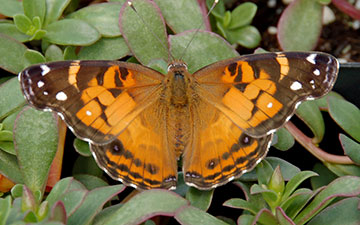 |
Previous Issues |
| Cedar Mill Community Website |
|
Search the Cedar Mill News: Search the Cedar Mill News
|
About The Cedar Mill News |
|
|||||||
| Volume 17, Issue 9 | September 2019 |
||||||
Grow Organically
|
||||
 |
| Painted Lady Butterfly Photo by and (c) 2007 Derek Ramsey (Ram-Man) commons.wikimedia.org/w/index.php?curid=2244053 |
In our garden is a butterfly bush that attracts butterflies all summer with its fragrant blooms. This year I have seen only one Oregon swallowtail butterfly and one painted lady! This shrub is right outside of my kitchen window that I pass by dozens of times a day.
This is very disturbing, and is a symptom of what is happening all over the globe. A great increase in insecticide use, loss of habitat, and a warming climate are all contributing to the disappearance of butterflies and many other insects. Neonicotinoids, insecticides that are toxic to bees, butterflies and most other insects, can remain very toxic for 1,000 days! Their use has increased 50 times in recent years.
Recently I read an article about an “insect apocalypse” that told of insects disappearing all over the world, a collapse of insect populations. This is very disturbing because these creatures have an important role to play in our world. Nesting birds feed their hatchlings with fat-rich insects. Imagine the world without birds! Nearly all bird species are already showing signs of decline, says Steve Holmer of American Bird Conservancy. And insects are the pollinators for almost all plants, including those we depend on.
Butterflies are so visible in our gardens and that is why their absence is so notable. I grow several flowers in my garden for butterflies, and this is the first time I have noticed their absence. These fragile flying jewels carry pollen from flower to flower ensuring fertilization. Every butterfly is dependent on specific plants where they lay their eggs. The caterpillars that hatch eat the leaves before metamorphosing into the adult that we see flying and visiting our gardens.
We must all be willing to do our part to save the wild creatures by reducing our use of chemicals that harm therm. Lest we forget, these chemicals also harm us, our children and grandchildren!
Questions? Email me at margierose2@gmail.com or call 503-645-2994.
![]()
Like us on Facebook for timely updates
Published monthly by Cedar Mill News LLC
Publisher/Editor:Virginia Bruce
info@cedarmillnews.com
PO Box 91061
Portland, Oregon 97291
© 2018